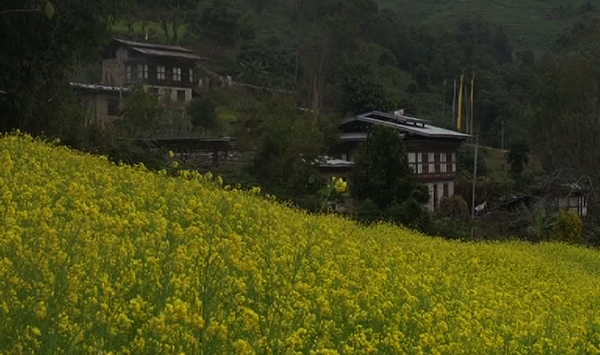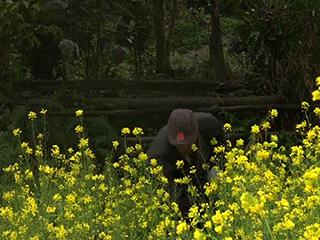 Blooming mustard flowers turned Zhemgang gloriously yellow, every winter. For the locals, the blooming flowers were sign of bountiful harvest. They had even worked out a method of pressing mustard oil from the seeds.
Blooming mustard flowers turned Zhemgang gloriously yellow, every winter. For the locals, the blooming flowers were sign of bountiful harvest. They had even worked out a method of pressing mustard oil from the seeds.
But, as modernisation seeped in and cheap cooking oil became readily available in the market, Zhemgang stopped turning as gloriously yellow, every winter. Even the traditional method of extracting mustard oil has almost become a tale of the yore. 
Many have given up the practice of growing mustard. They simply couldn’t compete with the factory-produced cooking oil. Many felt it was too laborious to carry on with the age-old tradition.
But, a small village called Kikhar, 30 kilometers the west of Zhemgang town, continues to practice the traditional method of pressing mustard oil.
After harvest, the villagers toast the seeds lightly or either dries it in the sun. The seeds are then beaten in a large mortar and pestle until it takes a semi-powdery form. The powder is then steamed and put in a bamboo basket. The basket is pressed between two planks and out trickles the extremely pungent yellow-coloured oil.
Kikhar continues to retain the tradition. Thanks to the village elders. The village elders have able been able to convince the younger generations that it is better to consume locally-produced oil than rely on the ones that are factory-made and imported.
Kinley Tenzin of Kikhar says they use mustard oil for cooking and lighting butter lamps, among others. The remains after pressing is then fed to the cattle, he says.
Another villager, Dorji says home-produced mustard oil is the best. “But pressing oil using traditional method is vanishing because our land has turned infertile.”
Along with the decline in the use of traditional method, many villagers feel they are losing a part of who they are. “That’s was how our forefathers lived,” says Kinlery Tenzin.






